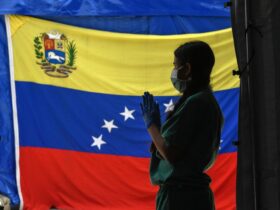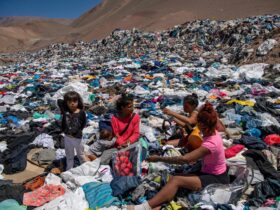Often referred to as the “Lungs of the Earth,” the Amazon rainforest “produc[es]20% of the world’s oxygen” and holds “more than a third of all carbon stored by tropic forests worldwide.” It also contains “20% of the world’s flowing freshwater… a third of all known terrestrial species… [and]10% of all biomass on Earth.” To Indigenous peoples, environmentalists and climate activists alike, the Amazon rainforest is a precious resource not only to cherish but also a vital asset necessary to our planet’s survival.
Excluding oceans, the Amazon is the world’s most important carbon sink and a critical tool in combating climate change, but it continues to be exploited and deforested at irreversible rates. All too often, throughout the region, and around the world, environmental activists are threatened and harmed by those who wish to silence their quest for justice. In Brazil “[b]etween 2002 and 2013, at least 448 environmentalists were killed,” and in just 2020 alone, amidst a global pandemic, over 200 environmental activists were murdered, and over 50% of these murders took place in Latin America.
As a result of this violent history, Latin America has gained the reputation as “[t]he deadliest place [on Earth]for environmental activists.” Historically, the root of this brutality can be attributed to a colonial and neo-colonial legacy of extractivism and unequal distribution of power, permitting multinational corporations and organized crime groups to face little to no repercussions for their actions.
Under the current Bolsonaro regime, this violent trend has continued, with Brazil oscillating between the first and fourth deadliest country for environmental activists. Bolsonaro also slashed the budget for the Brazilian Institute of Environment and Renewable Natural Resources (IBAMA), the country’s environmental policy agency. Furthermore, Brazil concurrently faces its highest number of land conflicts since 1985, suggesting that within recent history, a near-unprecedented infringement on Indigenous land and environmental rights is taking place. As sovereign Indigenous land is being destroyed, the criminals go without trial for their unlawful actions.
Just several weeks ago, while conducting research, British journalist Dom Phillips and Indigenous peoples expert Brun Pereira went missing in the Javari Valley, a region where concerns were raised about organized crime groups in the area as early as 2021 by local Indigenous tribes, yet their voices fell on deaf ears.
Following the initial disappearance, police took little to no action and only conducted a search after facing international pressure. After a “thorough” ten-day investigation, police found the bodies of the two researchers, and they swiftly concluded that the journalists were murdered by three local fishermen who had no connection to organized crime. However, given the outspoken anti-Bolsonaro rhetoric by the team of journalists in the past and the history of organized crime in the area, many have grown skeptical of the investigation’s findings.
This skepticism, in part, also arises from the infrequent nature in which the murderers of environmental activists are prosecuted, and even rarer that “the masterminds behind the plots… stand trial.”
Therefore, how can Brazilians, and the world, believe there is not more to the story in the case of Phillips and Pereria?
After the (lack of) initial response by the Brazilian government, one Brazilian NGO noted, “Through his omission in the search efforts or the way he has encouraged these criminals, the Bolsonaro government’s fingerprints are all over this tragedy.” Unfortunately, as time passes, the public’s attention to the situation gradually wanes, and soon the valid skepticism fades to rumors of the past.
Although the attention fades, the danger faced by activists does not. Throughout Latin America, environmental protectors continue to risk their lives, and without drastic governmental and societal reform, the deadly situation for activists is unlikely to change.
To enact change, Brazilians will not only need to show up at the polls come October but they must also hold their elected officials accountable with sustained pressure, and the pressure cannot only come domestically. Only with the combined force of constituents and international powers, NGOs and media can true change be enacted to provide justice for environmental activists.
Brazil and the rest of Latin America have some of the most crucial habitats for the planet’s survival, but these resources and their protectors are rapidly disappearing. The international community must be more aware and vocal about the treatment of environmentalists to help ensure their safety and the survival of our planet because the Earth is dying and so are the people trying to protect it.







